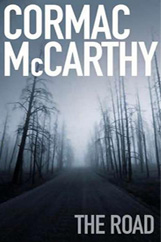Cormac McCarthy
 The Road by Cormac McCarthy is a novel of survival in post-apocalyptic America. The world as it was no longer exists. Black ash years later continue to rain down on everything. There are no specifics as to what actually happened to cause this apocalypse, but the few clues the author gives us suggest a nuclear bomb: “The clocks stopped at 1:17. A long shear of light and then a series of low concussions … A dull rose glow in the windowglass” (52). A father and his young son, survivors, are traveling “the road” from their home in the north in expectation of reaching the south, where they expect to survive the winter.
The Road by Cormac McCarthy is a novel of survival in post-apocalyptic America. The world as it was no longer exists. Black ash years later continue to rain down on everything. There are no specifics as to what actually happened to cause this apocalypse, but the few clues the author gives us suggest a nuclear bomb: “The clocks stopped at 1:17. A long shear of light and then a series of low concussions … A dull rose glow in the windowglass” (52). A father and his young son, survivors, are traveling “the road” from their home in the north in expectation of reaching the south, where they expect to survive the winter.
All that they own has been packed into a supermarket cart: blankets, the little food and water they have managed to salvage along the way, what extra clothes they have, anything of use they find in homes or markets that escaped the fires and overlooked by survivors before them. When the novel opens, the pistol the father carries for protection contains three bullets in it. At the end of their journey, it contains only one. He has had to kill in order to survive. And because the survivors of the apocalypse fall into two categories—the good and the bad—he has taught his son how to do what he must if something happens to him: commit suicide. The bad people consist of cannibals, pederasts, all types of evils; yet there must be others like themselves, and he hopes the south will yield those good.
We’re never told the names of any of the characters because each is representative of a member of the surviving larger group.
This novel reminded me of other post-apocalyptic novels I had read, particularly The Stand by Stephen King, an allegory symbolizing the battle between good and evil, in which we are always left with the hope that good will win out. And in this case, just as things get their worst, again there is that hope resurfacing.
Black ash swirls everywhere through their entire journey. Sometimes the snow, no longer white but gray, falls; and soon it, too, is covered with black ash. When they reach the coast, the father’s promise of blue water to his son is dashed by the black ash covering the surface.
Yet the south holds hope of a future. Whatever has caused the apocalypse has left many of the survivors, among them the father, with tuberculosis. His endless cough, full of blood, presages his destiny. The young boy, his son, is a Christ figure, and any hope of a future world lies in him. “He knew only that the child was his warrant. He said: If he is not the word of God God never spoke” (5). And later, after he has had to kill to protect his son, he tells him: “My job is to take care of you. I was appointed to do that by God. I will kill anyone who touches you” (77).
The entire countryside had been scavenged, but almost everywhere they stop—places that had not been completely burned or otherwise destroyed—the father ingeniously manages to find something of substance to keep them going. In one place he drains oil from long ago discarded oilcans to have enough for a lamp he improvises from a bottle and a rag. After all, he has a mission. The boy is his “warrant,” and though it seems he is too ill to last much longer, he must somehow keep the boy alive.
McCarthy manipulates the language so that the mostly staccato sentences and phrases give the reader the impression of dancing, more specifically, of waltzing, thus creating a lightness in the midst of the hopelessness and dangers the two encounter throughout the entire journey. Also, this simple language reemphasizes the fact that the young son, born after the apocalypse, is learning about a world he knows nothing of from the stories his father, his only teacher, tells him. In addition, the short, simple sentences are reminders of their simple goal: stay alive.
The mother, unable to endure any more of the dangers they constantly faced in their efforts to survive, and completely without any hope of survival, had taken her life sometime before. Unable to convince her husband to do the same—as well as take the boy’s life—she had used a small piece of obsidian, leaving the few bullets left in the gun for their protection. When they set out on their journey south, the son never looks back, nor does he speak of his mother. The omniscient point of view with an unknown narrator adds to the suspense, giving the reader very few clues as to how the story will end.
Reviewed by Lee L. Peoples